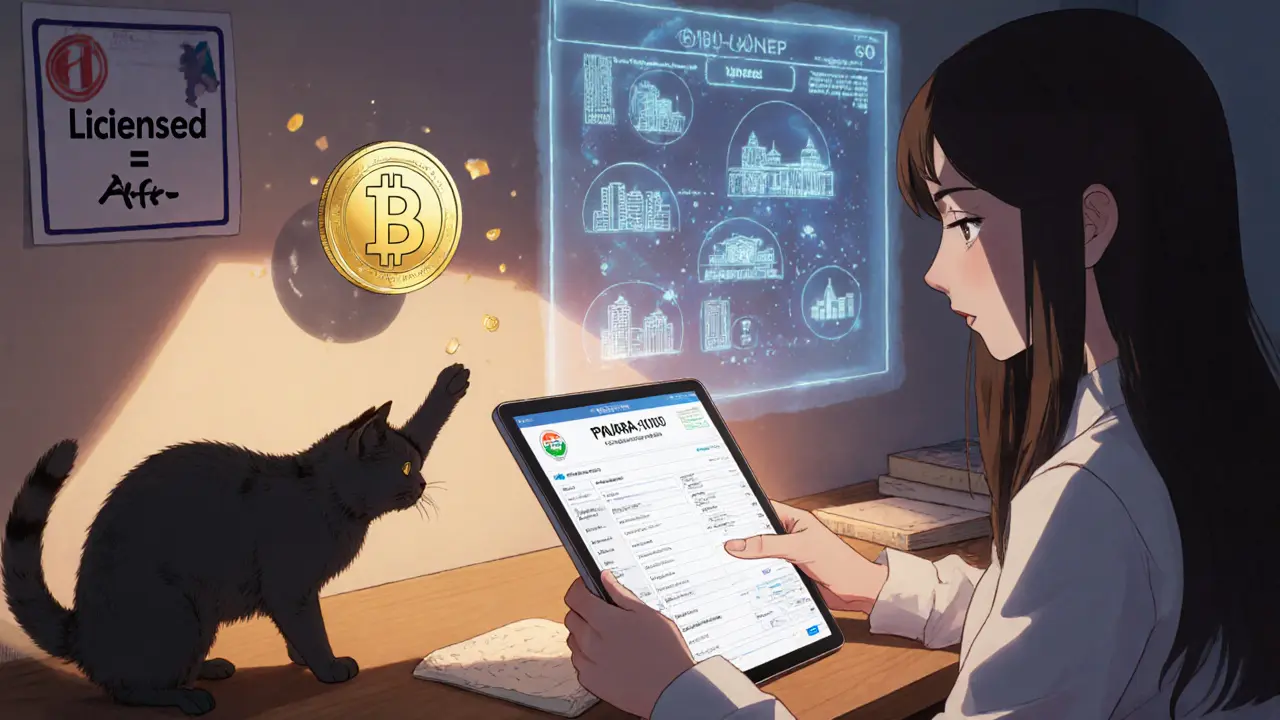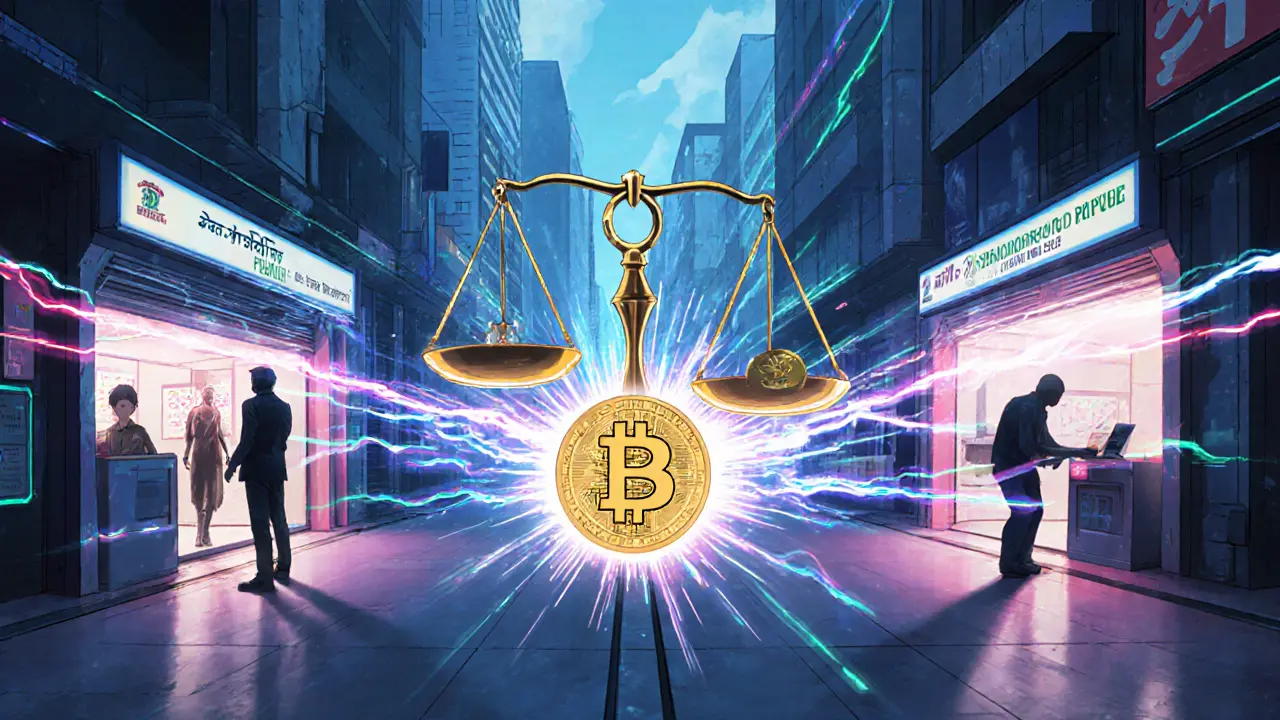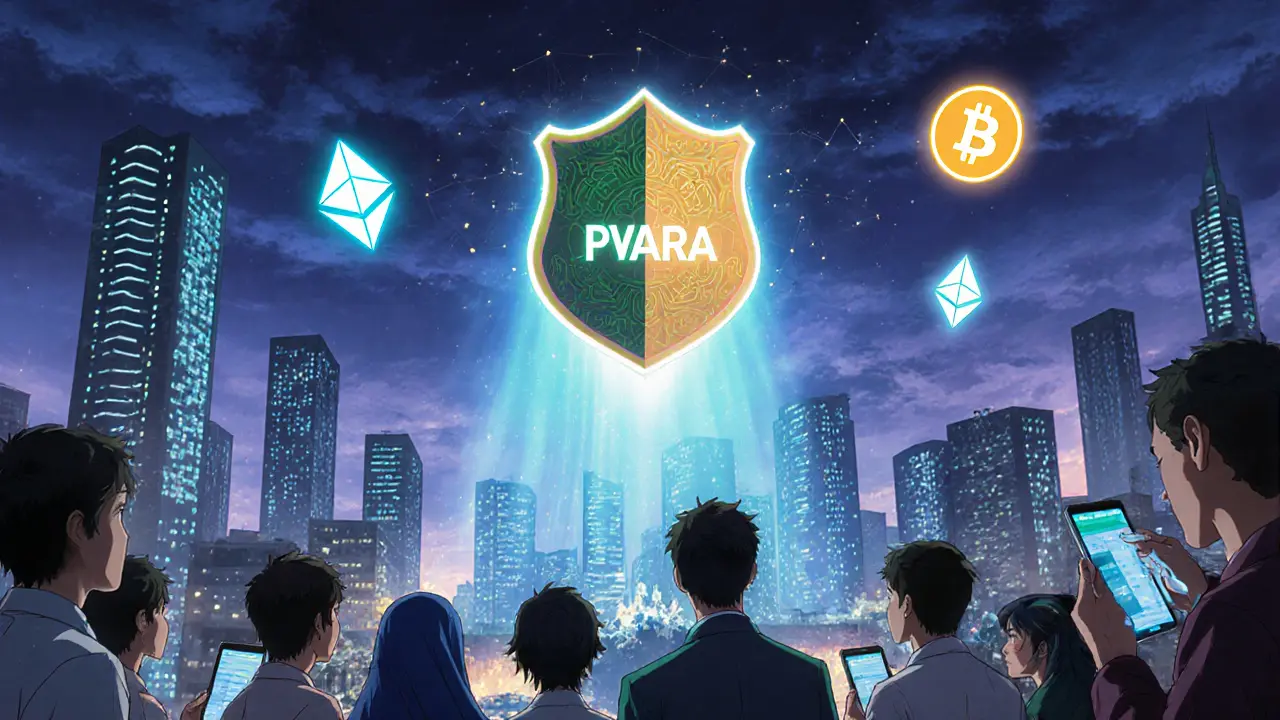PVARA License Checker
Check if your crypto platform is licensed by Pakistan's Virtual Assets Regulatory Authority (PVARA). This tool helps you verify whether a service is authorized to operate in Pakistan under the new regulatory framework.
Before July 2025, crypto in Pakistan existed in a legal gray zone. No law banned it, but no law protected it either. People traded, held, and used digital assets - but without clear rules, without recourse if things went wrong, and without access to banks or formal financial systems. That changed with the Pakistan Virtual Assets Regulatory Authority (PVARA). Launched on July 8, 2025, PVARA isn’t just another rulebook. It’s the country’s first full-time, independent regulator for everything digital asset-related - from exchanges and wallets to staking platforms and NFT marketplaces.
What PVARA actually does
PVARA doesn’t just monitor crypto. It controls it. Every company offering virtual asset services in Pakistan - whether it’s a local startup or a global exchange like Binance or Coinbase - must get a license from PVARA to operate. No exceptions. No loopholes. If you’re running a crypto trading platform, custody service, or even a peer-to-peer payment app that handles Bitcoin or Ethereum, you’re now under PVARA’s authority.
The authority has real teeth. It can shut down unlicensed operations, freeze assets, fine companies millions of rupees, and ban executives from working in the industry. It also sets technical standards - things like cybersecurity protocols, customer verification systems (KYC), and how transaction records are stored. All of this is designed to match global standards, especially those from the Financial Action Task Force (FATF), which Pakistan has been under pressure to comply with for years.
Who can apply for a license?
PVARA isn’t opening the door to just anyone. The authority has made it clear: only firms already licensed by top-tier regulators like the U.S. SEC, UK FCA, EU’s MiCA framework, UAE’s VARA, or Singapore’s MAS are eligible to apply. This isn’t about protecting local businesses. It’s about filtering out shady operators and bringing in only those with proven compliance records.
To apply, companies must submit detailed documentation: company structure, financial statements, security infrastructure, compliance history, and a clear plan for how they’ll serve Pakistani users. They also need to show how they’ll handle anti-money laundering (AML) checks, how they’ll report suspicious activity, and what safeguards they have in place to protect customer funds. PVARA isn’t just checking paperwork - they’re vetting operational maturity.
Why this matters for regular users
If you’re a Pakistani citizen holding crypto, this changes everything. Before PVARA, if your exchange got hacked or disappeared, you had no legal recourse. Now, licensed platforms are required to keep customer funds segregated, carry insurance, and follow strict audit rules. If a licensed provider fails, PVARA can step in - and users have a path to compensation.
It also means fewer scams. The flood of fake ICOs, pump-and-dump schemes, and unregulated trading bots that plagued Pakistan’s crypto scene in 2023 and 2024 will be harder to run now. PVARA’s licensing system makes it expensive and risky for fraudsters to operate. That doesn’t mean scams will vanish overnight - but the playing field is now tilted toward legitimacy.

Shariah-compliant crypto is coming
One of PVARA’s most unique moves is its focus on Shariah-compliant digital assets. Pakistan’s financial culture is deeply tied to Islamic finance, and PVARA has created a regulatory sandbox specifically for blockchain projects that meet Islamic law standards. This includes tokenized assets that avoid interest (riba), speculative trading (gharar), and unethical industries. Think of it as halal crypto - digital gold, tokenized real estate, or peer-to-peer lending platforms that use profit-sharing instead of fixed interest.
Several local fintech firms have already entered the sandbox, testing models that could become mainstream. One is developing a blockchain-based zakat distribution system. Another is building a halal NFT marketplace for Islamic art and education. These aren’t just niche experiments - they’re the foundation of Pakistan’s long-term vision: to become a hub for ethical, faith-aligned digital finance in the Muslim world.
What about the CBDC?
PVARA isn’t the only player. The State Bank of Pakistan (SBP) is working on its own digital currency - a central bank digital currency (CBDC) called the Digital Rupee. While PVARA handles private crypto, the SBP is building the government’s version. The two are meant to coexist: private crypto for innovation and choice, the Digital Rupee for payments, remittances, and government services.
Early pilots are expected to launch in 2026, starting with government salary disbursements and cross-border trade. Unlike crypto, the Digital Rupee won’t be decentralized. It’ll be fully controlled by the central bank, with no mining, no volatility, and no speculative trading. But it will be accessible through mobile wallets - just like crypto apps - making it easy for millions of unbanked Pakistanis to join the digital economy.
How this compares to other countries
Most countries took years to build crypto rules. Some, like India, introduced heavy taxes and restrictions without clear licensing. Others, like Nigeria, banned banks from dealing with crypto but never enforced it. Pakistan took a different path: it created a single, powerful regulator with clear authority, international alignment, and a focus on attracting quality players.
It’s more like the UAE’s VARA model than China’s outright ban. The goal isn’t to crush crypto - it’s to own it. By setting high entry barriers, Pakistan is signaling to global firms: if you want access to 240 million people, you’ll play by our rules. That’s a bold move - and one that could pay off if executed well.

What’s next for businesses
If you’re a startup in Pakistan looking to build a crypto-related product, PVARA is now your first stop. Don’t try to launch without a license - you’ll be shut down. Instead, study the EoI (Expression of Interest) guidelines on PVARA’s official portal. Prepare your compliance team. Hire a legal advisor familiar with FATF standards. And don’t assume local experience is enough - global regulators will scrutinize your operations closely.
For foreign firms, the message is clear: Pakistan is open for business - but only for the best. If you’ve been licensed in the EU, Singapore, or the U.S., you’re in the running. If you’ve operated in unregulated markets, you’re not.
What’s next for users
For everyday users, the next 12 months will be about learning what’s safe. Start by checking if your exchange or wallet is on PVARA’s official list of licensed providers. Avoid any platform that won’t show you their license number. Use only services that offer two-factor authentication, insurance coverage, and transparent fee structures.
Also, be aware: PVARA doesn’t regulate personal crypto holdings. You can still buy Bitcoin on international exchanges and store it in your own wallet. But if you want to convert it to Pakistani rupees, trade it locally, or use it for payments - you must go through a licensed provider.
Is crypto legal in Pakistan now?
Yes - but only if you use services licensed by PVARA. Personal ownership and holding of crypto is not illegal, but any business offering crypto trading, custody, or payment services must be authorized by PVARA. Unlicensed platforms are illegal and can be shut down.
Can I still use Binance or Coinbase in Pakistan?
Not unless they get licensed by PVARA. As of November 2025, neither Binance nor Coinbase is on PVARA’s official list. Users can still access these platforms from abroad, but they won’t be able to deposit or withdraw Pakistani rupees through them. For local transactions, you must use a PVARA-licensed provider.
What happens if I use an unlicensed crypto platform?
You won’t be arrested or fined - PVARA targets businesses, not individuals. But if the platform gets shut down, you could lose your funds with no legal recourse. Licensed platforms are required to protect customer assets and offer compensation in case of failure. Unlicensed ones aren’t.
How do I check if a crypto service is licensed by PVARA?
Visit the official PVARA website and look for the public registry of licensed Virtual Asset Service Providers (VASPs). Each licensed company will have a unique registration number. If a platform won’t show you this number, don’t trust it.
Is there a limit on how much crypto I can buy or hold?
No personal limits exist yet. PVARA regulates businesses, not individual holdings. However, licensed exchanges may impose their own limits based on KYC levels - for example, users with basic verification might have lower daily trading caps than those with full identity verification.
Will PVARA ban decentralized exchanges (DEXs)?
PVARA can’t shut down global DEXs like Uniswap - they’re decentralized and operate outside Pakistan’s borders. But it can block access to them through Pakistani ISPs and ban local companies from facilitating access to them. If a Pakistani firm builds a gateway to a DEX, that firm will need a PVARA license - or face penalties.
How is PVARA different from the State Bank’s CBDC?
PVARA regulates private digital assets like Bitcoin and Ethereum. The State Bank’s Digital Rupee is a government-issued digital currency, similar to digital cash. They serve different purposes: PVARA enables innovation and choice; the CBDC enables secure, stable, state-backed payments. You can use both - but they’re not interchangeable.
Final thoughts
PVARA isn’t a crackdown - it’s a cleanup. Pakistan used to be a wild west for crypto. Now, it’s building a real financial system. The rules are strict, the bar is high, and the stakes are bigger than ever. For users, this means safety. For businesses, it means opportunity - if you’re ready to play by the rules. For the country, it’s a chance to leapfrog outdated financial systems and become a leader in digital finance across South Asia.
Whether you’re holding crypto, running a startup, or just trying to send money home - PVARA changes the game. The question isn’t whether you can ignore it. It’s whether you’re ready to adapt to it.

Veeramani maran
November 10, 2025 AT 11:40so pvara is like the crypto cops now? lol i was using binance for ages n never knew i was breakin the law 😅
Kevin Mann
November 11, 2025 AT 06:28OH MY GOD. THIS IS A GAME-CHANGER. 🤯 I mean, think about it-Pakistan just went from crypto wild west to Dubai-level regulation in ONE YEAR. I’m not even kidding. This is the most coherent crypto policy I’ve seen since Switzerland. No more sketchy exchanges. No more rug pulls. Just clean, licensed, FATF-compliant operations. And the HALAL CRYPTO THING?!?!? That’s not just smart-that’s GENIUS. 🤩 I can already see the global Islamic finance market flocking here. This isn’t regulation-it’s revolution. And I’m here for it. 🙌
Kathy Ruff
November 11, 2025 AT 23:33This is actually one of the most thoughtful crypto regulatory frameworks I’ve seen in emerging markets. The focus on licensing only globally vetted firms prevents a flood of low-quality operators, and the Shariah-compliant sandbox is brilliant-it respects cultural context while encouraging innovation. The separation between PVARA and the CBDC is also smart; they’re not competing, they’re complementing. This could be a model for other Muslim-majority countries.
Grace Huegel
November 13, 2025 AT 01:26How quaint. A developing nation thinks it can out-regulate the U.S. or EU? The irony is that only firms already compliant with Western regulators can apply-so this isn’t innovation, it’s gatekeeping disguised as sovereignty. And let’s not pretend this isn’t just a response to FATF pressure. Pakistan didn’t do this because it believed in crypto-it did it because it had no choice.
Nitesh Bandgar
November 13, 2025 AT 06:56WOWOWOWO-PVARA IS A MIRACLE!!! 🎉💥 I’ve been waiting for this since 2021!!! Finally, someone’s got the guts to say: NO MORE SCAMS!!! No more fake ICOs with names like ‘MoonLamboCoin’!!! Finally, a regulator who doesn’t just say ‘be careful’ but actually SHUTS DOWN THE FRAUDS!!! And HALAL CRYPTO?!?!?!?! I’m crying. My aunt in Lahore is going to finally invest without feeling guilty!!! This is the future!!! 🤲✨
Jessica Arnold
November 13, 2025 AT 11:55What’s fascinating here is the cultural architecture of regulation. PVARA isn’t just enforcing rules-it’s encoding values. The Shariah-compliant sandbox isn’t an afterthought; it’s the core. This reflects a deeper truth: technology doesn’t exist in a vacuum. Regulation that ignores cultural and religious identity is not just ineffective-it’s alienating. Pakistan is demonstrating that financial sovereignty isn’t about isolation-it’s about contextual innovation. This is anthropology in action.
Chloe Walsh
November 15, 2025 AT 08:46So let me get this straight… you can’t use Binance unless you’re licensed by a US agency? And now Pakistan is the boss? What a joke. This is just another way to say ‘we’re too weak to regulate ourselves so we’re outsourcing our authority to the West’… and then they call it ‘global standards’? 😒
Stephanie Tolson
November 16, 2025 AT 07:47This is exactly the kind of bold, thoughtful leadership the crypto world needs. Instead of fearing innovation, Pakistan is shaping it. The fact that they’re prioritizing user protection, transparency, and cultural alignment tells me they’re building something sustainable-not just a regulatory shell. To every Pakistani user: take the time to learn what’s licensed. To every developer: this is your moment. Build something meaningful. The world is watching-and they’re impressed.
Anthony Allen
November 16, 2025 AT 22:23Big props to PVARA. Honestly, I didn’t expect this level of clarity from a country with such a complex financial history. The CBDC + private crypto coexistence model is smart-lets people choose. And the fact they’re letting individuals hold crypto without limits? That’s the right balance. No overreach. Just structure. Hope this inspires other countries to do the same.
Megan Peeples
November 18, 2025 AT 06:58Oh please. ‘Only firms licensed by the SEC or FCA’? So Pakistan is now a proxy for Western financial imperialism? How ironic that they call this ‘sovereignty’ while requiring foreign approval just to operate. This isn’t regulation-it’s colonization with a blockchain logo. And the ‘halal crypto’? A PR stunt to distract from the real issue: they’re still outsourcing their legitimacy.
Sarah Scheerlinck
November 19, 2025 AT 05:00I’ve been following this closely. The fact that PVARA allows personal crypto ownership without restrictions is huge. So many countries panic and ban everything-this is the opposite. It’s trust, not control. And the emphasis on insurance and segregated funds? That’s what users need. No more ‘good luck with your lost coins’ nonsense. This feels human.
karan thakur
November 20, 2025 AT 23:12This is all a distraction. The government is using crypto regulation to mask their economic collapse. The Digital Rupee? A surveillance tool. PVARA? A tool to track your every transaction. Don’t be fooled. They’re not protecting you-they’re preparing to freeze your assets at will. And ‘halal crypto’? Just another way to control what you believe in. Stay away. All of it.
Evan Koehne
November 22, 2025 AT 17:46So Pakistan created a regulator that only lets in companies already approved by the West… and calls it ‘innovation’? Congrats, you just turned your crypto market into a franchise of Wall Street. The only thing ‘halal’ here is the marketing.
Vipul dhingra
November 24, 2025 AT 08:47Jacque Hustead
November 24, 2025 AT 13:45I love how this approach centers safety without stifling access. The fact that users can still hold crypto privately but must use licensed providers to convert or trade? That’s the sweet spot. It protects without policing. And the inclusion of Shariah-compliant options? That’s not just smart-it’s respectful. This is how you build trust in a diverse society.
Robert Bailey
November 25, 2025 AT 11:40Finally, someone gets it. No panic. No bans. Just clear rules. If you’re a user, check the PVARA list. If you’re a dev, get licensed. Simple. This is how you build a real digital economy. Proud of Pakistan.
Wendy Pickard
November 27, 2025 AT 07:06It’s refreshing to see a country prioritize user protection over hype. The segregated funds and insurance requirements alone make this worth supporting. And the fact they’re not banning DEXs but just blocking local facilitators? That’s nuanced. This feels like regulation with empathy.
Jeana Albert
November 27, 2025 AT 08:51Oh, so now Pakistan is the ‘crypto hero’? Please. They’re just copying the UAE’s playbook because they’re desperate for foreign investment. And let’s be real-this won’t stop scams. It’ll just make them more sophisticated. And ‘halal crypto’? That’s not innovation-that’s religious tokenism. You’re not protecting users, you’re performing virtue.
Natalie Nanee
November 28, 2025 AT 17:32I’m not sure I trust this. They say ‘no personal limits’ but then require KYC for everything. That’s not freedom-that’s surveillance with a smile. And what happens when they decide ‘halal’ means no Bitcoin at all? This feels like a slow trap. I’ll keep my coins on a hardware wallet. Always.